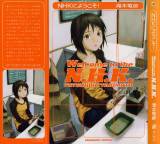|
>>
|
No. 35748
[Edit]
File
162293942177.jpg
- (383.76KB
, 1558x1400
, 914899a4acd2018014ea301f4f5c9ed47e184040.jpg
)

I reread the novel but in Japanese this time. I noticed some differences between it and the Tokyopop translation.
Satou's hikikomori song lyrics use the old kana orthography, e.g. きょう is written as けふ. Likewise, later in the novel, "tetsuhou" was actually written as てつはう. This doesn't really come across in the translation.
When Yamazaki is drunkenly rambling about Nanako, he first uses "boku" but then corrects himself by saying, "iya, kono ore ga," which is lost in translation, where he just says, "I... I," making it sound like he's merely hesitating or stuttering.
There's a part where Satou is describing what he thinks Misaki will say and do to him in response to his actions by the elementary school. In doing so, he quotes or paraphrases the Bible and refers to what is supposedly the corresponding verse, but he gets the first two references wrong. For some reason, the way it's wrong differs between the Japanese text and the translation, and the translation quotes a different verse for the second one. I wonder why.
>神はすべての罪を知っている!(ルカ 18:18)
Luke 18:18 has nothing to do with the quote.
>み子に従わない者は命を見ない!(ヨハネ 3:16)
He refers to John 3:16, but the text is more in line with John 3:36.
>The Lord knows all your sins!
The endnote refers to John 3:20, but that verse doesn't really have anything to do with the quote.
>For if our heart condemns us, God is greater than our heart and knoweth all things
The endnote refers to John 3:36, but the text used here is actually pretty much 1 John 3:20.
At one point, Satou's narration reads:
>一句浮かんだ。
>
> 梅雨明けで、すかっと爽やか、スーサイド
I think that first sentence means something more like, "I thought up a haiku," even though it's 5-8-5 rather than the more typical 5-7-5. The translation reads:
>A line from a poem popped into my head: The end of the rainy season, refreshing, suicide.
which makes it sound more like he's remembering part of an existing poem that's not necessarily a haiku.
One thing that bugged me about the translation was the mismatched name order. They use "Satou Tatsuhiro" and "Misaki Nakahara" even though "Satou" and "Nakahara" are the family names. Of course, it's fine in the Japanese text.
At the beginning of chapter 8, there's this exchange:
>「持病の癪(しゃく)が!」
>「シャクって何?」
Misaki doesn't know the word 癪, so Satou berates her in his head to go study more. The translation uses the more common word "problems" instead, arguably making Misaki come off as more clueless than she was originally portrayed. There's a similar issue later on when Misaki quotes from a book, "retto itto bii," and then asks Satou what it means. In the translation, it's merely "Let it be" in plain English without an endnote or anything.
The text contains over 100 instances of 「…………」. In the translation, they seem to be omitted or replaced with things like, "I didn't say anything," "I had nothing to say," "I was speechless," "I didn't answer," etc., I guess because using ellipses that way can come off as incorrect, confusing, or annoying to English speakers.
Interestingly, the word ニート/NEET doesn't seem to be used anywhere in the main text. It only appears in a second afterword that was appended some time in or after 2005, years after the book's original date of publication. Speaking of which, there's a page near the end that notes that this story was originally serialized on the web in 2001.
>>29372
I really like the soundtrack and still listen to it sometimes even to this day. That said, the novel remains my favorite version for reasons similar to those mentioned by >>32676.
>>32674
I prefer the earlier cover art.
|